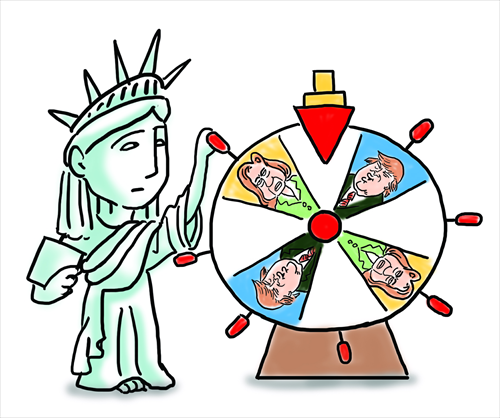HOME >> OP-ED
China faces risks of US presidential vote
By Zhang Guoxi Source:Global Times Published: 2016/8/1 18:18:39

Illustration: Liu Rui/GT
The world watches in awe as a divided US faces an agonizing choice: In less than four months, the Americans will have to choose between two of the most disliked and least trusted candidates in history, and, alas, make one of them their next president.
While the US' future teeters between a "fraud" who is "temperamentally unfit" to be president and a "crook" whom her enemies say barely escaped from criminal charges, a shadow has been cast over the prospects of China-US relations. Both Donald Trump and Hillary Clinton have repeatedly lashed out at China in this year's election for a host of issues that recurrently plague bilateral ties. As pledged in their newly released party platforms, Democrats will "stand up to Beijing" on trade and security issues, while Republicans have singled China out as a "threat" to US leadership in the Asia Pacific.
Lessons learned from the past seem to suggest that, even those presidents who initially took a hard-line position against China eventually come around and recognize the importance of maintaining stable China-US relations. While it is easy to dismiss China-bashing on the campaign trail as political pandering, it would be ill-advised to underestimate China's coming challenges, as the world's most important bilateral relationship will soon be tested even before the new US president assumes office.
First of all, China faces the challenge of guarding against volatile and unpredictable changes in China-US relations amid the unusual tension fueled by a highly competitive and provocative presidential race. According to the latest Pew survey, foreign policy is considered the third most important issue among registered US voters, trailing behind economy and terrorism. As the two candidates pivot to the fall election, they can be expected to direct more harsh criticism at China just to sharpen their own images as the next US commander-in-chief.
Although it is hard to assess the long-term impact of presidential candidates' biased attacks on China, the short-term effects of such reckless rhetoric will indeed prove hazardous for China-US relations, especially when combined with rising patriotic sentiments in China against the South China Sea ruling and over US deployment of Terminal High-Altitude Area Defense system in the Korean Peninsula. Instead of falling victim to Trump and Clinton's call for a tougher policy on China, Beijing and Washington should continue to engage each other in the ongoing dialogue of expanding cooperation and avoiding confrontation.
Secondly, China faces the challenge of coping with the changes, uncertainties, and even discontinuities in China-US relations that are generally implied in the process of US presidential transition. While a transfer of presidential power almost invariably brings about policy changes of varying degrees, party turnover transitions usually spell more trouble for China-US relations than intra-party transitions. As far as this year's election is concerned, China should expect more changes and unpredictability, for better or worse, from a Trump presidency, while preparing itself for a tougher but more consistent China policy from a Clinton presidency.
No matter who ends up in the White House, however, managing China-US relations during the often turbulent transition process will prove crucial for ensuring the continued growth of bilateral ties between the two nations. Specifically, China should pay special attention to the three-month lead-up period from election day to inauguration day, actively engaging the incoming administration on issues of mutual concern while reaffirming China's commitment to building a "new type of great power relations" with the US.
Finally, China faces the challenge of managing its expectations for the prospects of China-US relations during the next four years. The trajectory of China-US relations within a single presidency swings from positive to negative and vice versa. The first pattern is most evident in the transformation of China-US relationship from competition to cooperation under the George W. Bush administration, while the second pattern has revealed itself clearly during the Barack Obama presidency as the US' China policy shifts from engagement to hedging.
While China-US relations is subject to constant changes and periodic crises associated with the succession of US leaders, both countries need to focus more on long-term opportunities rather than short-term expectations. Therefore, instead of trying to predict which pattern a Trump or Clinton presidency will most likely fit into, China should devote more attention and effort to work with the US to institutionalize effective mechanisms and positive accomplishments in the relationship. President Xi Jinping and Obama's meeting at this year's G20 Summit in Hangzhou will serve as a positive step in this direction.
The author is a PhD candidate at Beijing Foreign Studies University and a visiting scholar with the Center for China-US Cooperation at the University of Denver. opinion@globaltimes.com.cn
Posted in: Viewpoint